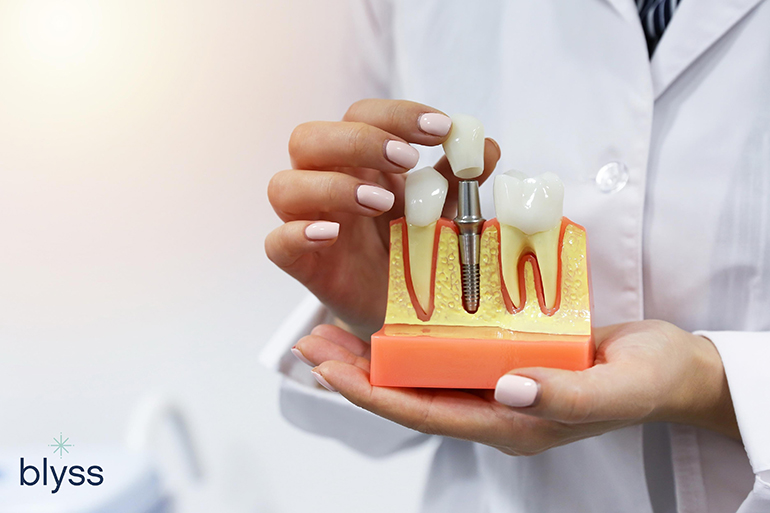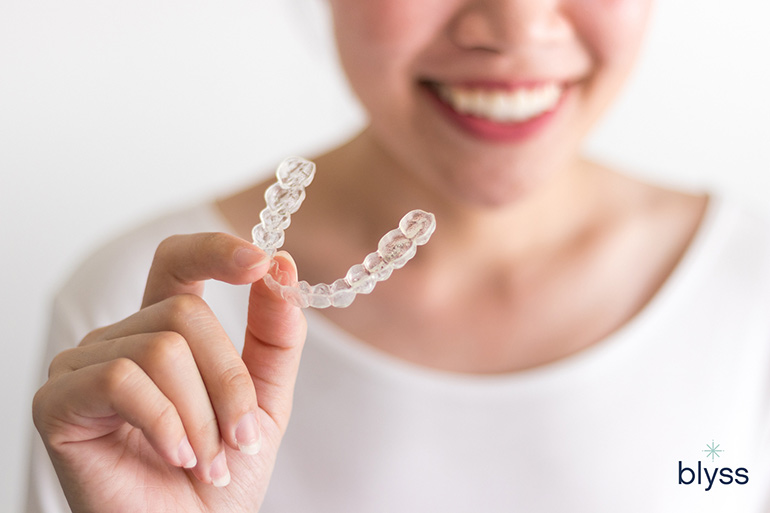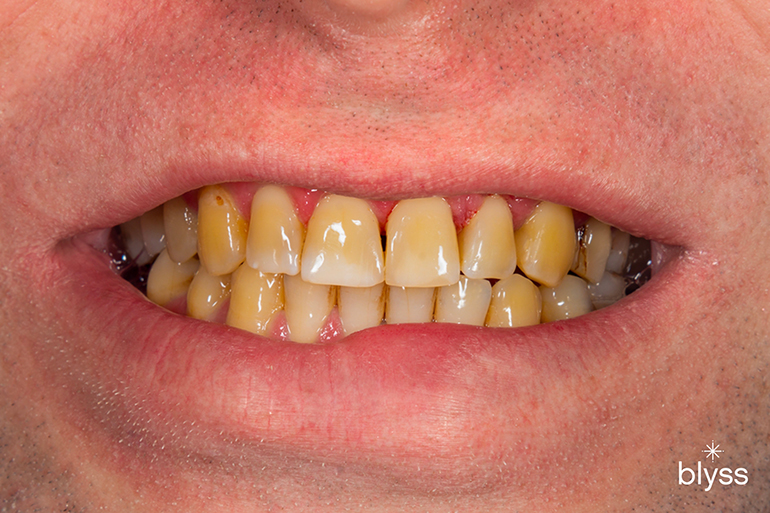Considering dental implants? If so, you’ll want to know the pros and cons of dental implants. According to the American Academy of Implant Dentistry, over 3 million people in the United States have dental implants, and that number is growing every year.
While dental implants are a great option for many people, they’re not right for everyone. I always help my implant patients here in San Diego and Del Mar by explaining the two sides of the coin. What are its advantages and disadvantages? Let’s find out.
The Pros: 5 Reasons Why You Should Get Dental Implants
If you are considering implants, here are five reasons why you should get them.
Pro #1: Dental Implants Look and Feel Like Natural Teeth
Losing a tooth can be a traumatic experience, both emotionally and physically. In the past, the options for tooth replacement were not ideal. Dentures are often uncomfortable and tend to slip, while bridges require grinding down the teeth adjacent to the empty space. Good thing, dental implants were invented! Dental implants are a popular and effective solution because they look and feel like your natural teeth.

You deserve to have a beautiful smile that makes you feel confident. With dental implants, you can get back the smile you once had or maybe even better than before.
They Look Like Natural Teeth
One of the main reasons people choose dental implants is because they look like natural teeth. That’s thanks to the fact that each implant is individually crafted to match the color, size, and shape of your existing teeth.
They Feel Like Natural Teeth
Another big reason people choose dental implants is that they feel just like natural teeth. Unlike dentures, which can slip and slide in your mouth, dental implants are securely anchored into your jawbone. This allows you to speak and eat with confidence, knowing that your replacement teeth won’t slip out of place.
Pro #2: Dental Implants Can Last a Lifetime
When it comes to your teeth, it’s important to invest in quality dental care. Whether that means getting braces as a teenager, or getting dental crowns later in life, putting money into your smile now will pay off in the long run. That’s why dental implants are worth considering—they’re a long-term investment that can last a lifetime.
With proper care and maintenance, dental implants can last for a long time. Unlike dentures, which will need to be replaced every 5-10 years, dental implants can remain in place as long as you take care of them.
How Dental Implants Are Made to Last
One of the reasons why dental implants are such a lasting solution for tooth loss is because of the materials they’re made from. Dental implants are made from titanium, which is one of the strongest and most durable metals in the world. In fact, titanium is so strong that it’s actually used in aeronautical engineering.
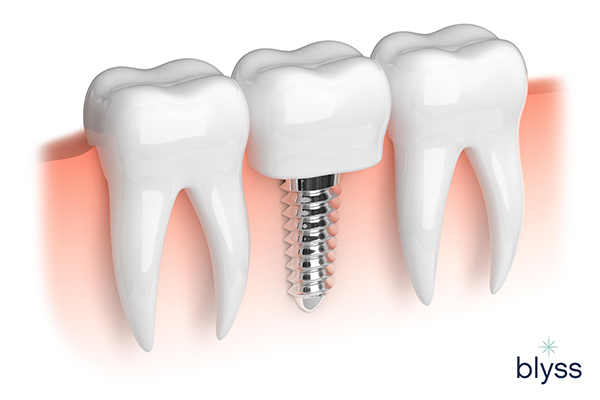
Titanium is an ideal material for dental implants because it is strong and durable, and it has the ability to fuse with bone tissue. It is resistant to corrosion and wears, and it is not magnetic, making it safe for use in dental MRI scans.
Your body will not reject titanium because it’s not only strong, but it’s also biocompatible. This is important because it means that once your implant has healed and integrated with your jawbone, it will become a part of you—literally.
Another reason why dental implants can last a lifetime is that they’re placed directly into your jawbone. This gives them added stability and support, which helps to prevent any further damage to your jawbone or teeth. Additionally, placing the implant in your jawbone helps to stimulate bone growth, which further increases the stability of the implant.
Related Post: Not All Dental Implants Are The Same: Know Why The Best Dentists Use Top Implant Brands
Pro #3: You Can Eat and Chew with Ease
The primary function of teeth is to bite and chew food. But in order to do this effectively, all of the different components of your mouth—from your lips and tongue to your teeth and gums—need to work together harmoniously. When you lose a tooth, it can throw off this delicate balance, making it difficult (or even impossible) to chew your food properly. Dental implants help to restore this balance by filling the gaps left by missing teeth.
Dental implants are the only type of tooth replacement option that actually replaces the entire tooth – root and all. This provides a number of benefits in terms of function, but one of the chief benefits is that it makes chewing much easier. The bone that supports your tooth (or multiple teeth) starts to deteriorate when you lose one or more.
This can cause your remaining teeth to shift out of place, which can make chewing more difficult. Dental implants help to avoid this by providing a new root for your replacement tooth (or teeth) and maintaining the integrity of your jawbone.
Pro #4: Dental Implants Prevent Bone Loss
One of the best things about dental implants is that they help to prevent bone loss in your jaw. Unlike other tooth replacement options, such as bridges or dentures, which rest on top of your gums, dental implants actually fuse with your jawbone. This helps to stimulate growth in the bone and prevent deterioration. In fact, studies have shown that bone loss is greatly reduced in patients who choose dental implants over other tooth replacement options.
What Causes Bone Loss in the Jaw?
Losing bone in the jaw is a serious issue that can have a significant impact on your oral health. When the bone deteriorates, it can lead to tooth loss and a change in the appearance of your face. In severe cases, the condition can even make eating and talking difficult.
Jawbone loss is often gradual, making it difficult to notice at first. However, there are some tell-tale signs that can indicate you are losing bone in your jaw, including
- Your teeth become loose
- A change in the fit of your dentures
- Receding gums
- An increase in the number of spaces between your teeth
- A collapsing bite
- Visible changes in the shape of your face
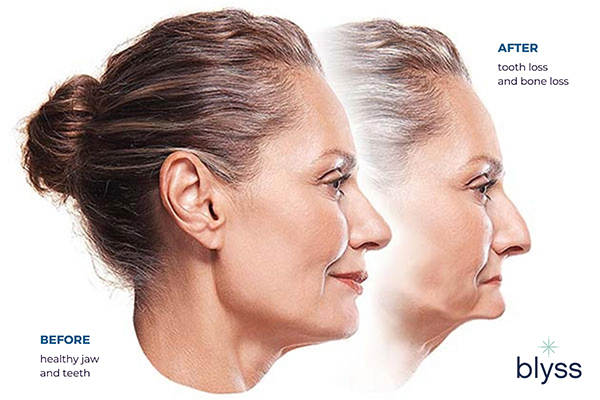
The bone that supports your teeth begins to shrink when you lose them. This can change the shape of your jaw and make your face appear sunken or hollow.
There are several different factors that can contribute to jawbone loss, including
Periodontal disease: This is an infection of the gums that breaks down the tissue and bone supporting the teeth.
Tooth loss: When teeth are lost and not replaced, it leads to a decrease in stimulation in the jawbone, which leads to atrophy (or shrinkage).
Trauma: Trauma to the face can damage the bones and lead to bone loss.
Genetics: Some people are simply more predisposed to developing conditions that cause jawbone loss.
Medication: Certain medications (such as steroids) can decrease bone density and lead to jawbone loss.
Eating disorders: People with anorexia or bulimia are at an increased risk for developing jawbone loss due to vitamin and mineral deficiencies.
Jawbone loss is most common in adults over the age of 50, but it can occur at any age. If you are experiencing any of the symptoms listed above, contact us at Blyss Dental so I can assess the situation and put together a treatment plan for you.
How Implants Help to Stimulate and Preserve the Jawbone
The surrounding bone starts to resort or break down when you lose a tooth. This is because there is no longer any stimulation being applied to that area of the jawbone. Dental implants act as artificial roots that provide stimulation to the jawbone when you chew or speak, which helps to prevent bone loss.
In addition, dental implants are made of titanium, which is a biocompatible material that actually fuses to the jawbone over time. This process, called osseointegration, helps to further stabilize the implant and preserve the jawbone.
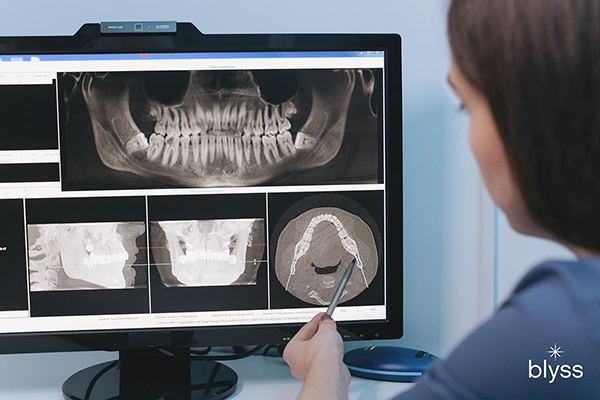
Did you know that the surrounding bone of your tooth starts to resorb or break down when you lose it? Dental implants are a great way to replace missing teeth and stimulate the surrounding bone.
How Implants Help Preserve Your Facial Structure
When you lose a tooth, the bone around that tooth begins to deteriorate. That’s because the roots of your teeth stimulate your jawbone, and when those roots are no longer there, the jawbone can begin to shrink. Over time, this shrinkage can change the shape of your face, making you look older than you really are.
Dental implants are the only option for replacing missing teeth that also preserves your facial structure. That’s because dental implants are placed directly into your jawbone, just like your natural teeth. This helps to stimulate the jawbone and prevent shrinkage.
Pro #5: Dental Implants Are Easy to Look After
Dental implants don’t require any special care – just brush and floss as you would with your natural teeth. They also don’t require special cleaning solutions or adhesives. This makes them easy to maintain and keep in good shape for years to come.
However, that doesn’t mean they don’t require any care at all. Here are a few tips from me on how to care for your dental implants
Making Your Dental Implants Last a Lifetime
Dental implants have been used for over 50 years to replace missing teeth. And while they’re not a new technology, they are constantly evolving. Today’s dental implants are stronger and more durable than ever before, and with proper care, they can last a lifetime.
Even though they are made to last, there are still some things you need to do in order to make sure they have the longest lifespan possible.
1. Brush Twice a Day and Floss Regularly. You need to brush your dental implants twice a day with a soft-bristled toothbrush just like your natural teeth. Be sure to use gentle toothpaste, as well. In addition to regular brushing, you also need to floss at least once a day.
2. Avoid Hard and Sticky Foods. When you first get dental implants, it is important to avoid hard and sticky foods until your mouth has had time to heal completely. After the initial healing period, you can resume your regular diet as soon as you feel up to it; however, you should still avoid chewing directly on the implant sites and biting into hard items like bones or unpopped kernels of popcorn. Also, since Halloween is just around the corner, be sure to cut sticky foods like caramel candy into small pieces before eating them.
3. See Your Dentist Regularly. It is important to see your dentist or oral surgeon regularly, especially in the first year after getting dental implants. These appointments give us an opportunity to check on the progress of your healing and make sure that your implants are functioning properly. As long as you care for your implants properly and see us for regular checkups, they should last for many years—perhaps even a lifetime!
4. Avoiding Bad Habits. Just like your regular teeth, it’s important to avoid bad habits that could damage your dental implants. That means no smoking or using chewing tobacco, as these habits can lead to gum disease which could damage the implant site. You should also avoid biting your nails or eating hard foods like ice cubes as this could crack or chip your implants. And finally, although it might be tempting to use your teeth as tools (I’m looking at you, bottle openers!), it’s best to avoid doing this as it could damage the implant site or loosen the false teeth.
5. Know When To Call The Dentist. Sometimes despite our best efforts, problems arise with our dental implants. If you experience any unexpected pain or swelling around your implant site, be sure to call our office right away so that we can take a look and provide any necessary treatment
The Cons: 5 Reasons Why You Shouldn’t Get Dental Implants
While dental implants have many pros, there are also some cons to consider before getting them.
Con #1: Dental Implants Are Expensive
Dental implants are long-term investments because they can last a lifetime. However, one of the biggest drawbacks to getting dental implants is their cost. The upfront cost of the procedure can be quite high, and if something goes wrong, you may be looking at even more expenses.
In the U.S., the cost of a single implant including the cost of the crown can range from $3,000 to $7,000. And we’re only talking about the cost of replacing a single tooth! Now, if you need full-mouth dental implants, expect to pay between $25,000 and $80,000.
For many people, the initial sticker shock is enough to deter them from getting implants altogether. So, before committing to dental implant surgery, it’s important to consider all of the financial implications and potential expenses.
What are the Costs Associated with Dental Implants?
There are several factors that can affect the cost of dental implants, including
- The number of implants being placed: The more implants you need, the more expensive the procedure will be.
- Whether or not you need a bone graft: If your jawbone is too thin or soft to support an implant, you may need a bone graft. This will add to the overall cost of the procedure.
- Your implant dentist’s level of expertise: More highly trained and experienced dentists, oral surgeons, or periodontists will often charge higher prices for their services.
- Your location: Dental implant procedures performed in major metropolitan areas tend to be more expensive than those performed in rural areas.
- The type of dental implant being used: Standard dental implants are made of titanium, but there are also zirconia and ceramic options available. These premium materials can add to the cost of your dental implants.
- The brand of dental implant: Different implant manufacturers offer a range of prices for their products.
- Your insurance coverage: Some insurance plans may cover part or all of the cost of your dental implants. Be sure to check with your insurer to see if they offer any coverage for this procedure.
- Any additional procedures needed: In some cases, you may need ancillary procedures such as sinus lifts or gum tissue grafts in order to have dental implants placed. These additional procedures will add to the overall cost of your treatment.
The Cost of Dental Implants vs. Other Treatments for Tooth Loss
People often compare dental implants to dentures and bridges which are less expensive treatment options for tooth loss. However, it’s important to keep in mind that dentures and bridges have a shorter lifespan than dental implants and often require more frequent replacements. In addition, dentures can be uncomfortable and bulky, while bridges require grinding down neighboring teeth for support.
In contrast, dental implants are designed to last a lifetime with proper care, and they don’t require sacrificing healthy teeth as bridges do. Furthermore, because they function just like natural teeth, dental implants are much more comfortable than dentures. When you consider the long-term costs and benefits of each treatment option, dental implants are actually quite affordable
Dental Implants May Be Covered by Your Insurance
Before you get discouraged, know that dental implants may be covered by your insurance.
While dental implant surgery is usually considered to be cosmetic and therefore not covered by insurance, there are some cases in which your insurance may cover part or all of the cost.
If your dental implant is being used to replace a tooth that was lost due to an injury or disease, your insurance may cover some or all of the costs associated with surgery and insertion of the implant.
Your dental insurance also covers other procedures related to your dental implants such as CT scans and extractions. So, this does help to lessen the total.
Make sure to check with your insurance provider to find out if your particular case qualifies for coverage. Also, check if your insurance plan covers pre-procedure treatments such as consultation and even bone grafting to lower your expense.
There Are Financing Options Available
If you’re considering dental implants but are worried about the upfront cost, there are financing options available that can make treatment more affordable. Many dentists offer in-house financing plans with low or no interest rates.
There are also third-party financing companies that offer loans specifically for dental procedures. These loans can have low-interest rates and flexible repayment plans to make treatment more affordable.
Tip: Call Blyss Dental to pre-qualify for financing options. Blyss has industry-leading financing options because we don’t just work with one or two financing companies. We work with at least 12 companies and counting in order to find you the best dental implant financing option available here in San Diego.
Related Post: Dental Implant Cost Insider Tips: How to Save Up to $20,000 On Your Dental Implant Procedure
Con #2: Unhealthy Lifestyle and Bad Habits Can Compromise the Dental Implants
When considering dental implants, it’s important, to be honest with yourself about your oral health because dental implants require a commitment to be taken care of.
So, if you don’t take care of your teeth now, there’s a chance you won’t take care of your implants either. Unless of course you commit to a new healthier lifestyle and avoid bad dental hygiene habits.
You need to brush all your teeth twice a day and floss them daily. Implants are no different. In fact, they may even require more care than natural teeth because nothing is better than natural teeth.
Considering your lifestyle, here are other reasons why dental implants might not be the right choice for you.
- You smoke heavily – Smoking cigarettes is one of the worst things you can do for your teeth and gums. It increases your risk for gum disease, which can lead to tooth loss. If you smoke cigarettes, it’s important to quit before getting dental implants. Otherwise, you might not be a good candidate for this procedure.
- You excessively consume alcohol – Drinking alcohol is another bad habit that can affect your dental implants. Drinking alcohol can also decrease blood flow to the gums and delay healing after surgery. Alcohol consumption can also lead to dehydration, which can make your gums more susceptible to infection.
- You have poor oral hygiene – Dental implants require good oral hygiene habits in order to be successful. This means brushing twice a day, flossing daily, and using mouthwash. If you don’t have good oral hygiene habits, it’s important to develop them before getting dental implants. Otherwise, you might end up with an infection that could cause the implant to fail.
- You take certain medications that suppress the immune system – Certain medications, such as steroids, can suppress the immune system. These drugs work by suppressing the immune system, which can make it more difficult for the body to heal. This increased risk of infection and delayed healing can make dental implants more difficult to place successfully and increase the likelihood that they will fail.
- You have an unhealthy diet – An unhealthy diet can also affect the success of dental implants. Eating sugary and acidic foods can cause tooth decay, which can lead to gum disease. If you have dental implants, it’s important to eat a healthy diet full of fruits, vegetables, and whole grains. This will help ensure that your implant lasts for many years to come.
Before you decide to get dental implants, it’s important to sit down and assess your lifestyle choices. If you have any unhealthy habits or don’t take good care of your teeth now, dental implants might not be the best solution for you.
Implants require significant financial investment and commitment of time and effort. They also require meticulous at-home care. If you’re not ready or willing to make that commitment, dental implants might not be right for you.
Con #3: Dental Implants Require a Healthy Mouth
While most people who are missing teeth are good candidates for dental implants, they are not suitable for everyone. This is especially true if you suffer from certain health conditions.
Dental implants require good oral health. If you have gum disease or other oral health problems, you may not be a good candidate for dental implants. The implant procedure itself can also aggravate existing oral health problems, so it’s important to get these resolved before considering implants.
Dental implants also require a strong jawbone. The implant posts are surgically placed into your jawbone and rely on them for support. If your jawbone is not dense enough, the implants may not be able to fuse properly or may eventually loosen and fall out.
Jawbone density can be an issue for people who have had teeth missing for a long time or who have had extensive dental work done in the past. A consultation with an experienced implant dentist can determine if your jawbone is suitable for dental implants.
Uncontrolled Chronic Health Conditions
Most people don’t know that there are certain chronic health conditions that can increase the risk of dental implant failure. These conditions include
- Uncontrolled Diabetes – One of the complications of diabetes is poor blood sugar control, which can lead to damage to the nerves and blood vessels. This damage can reduce the flow of blood and nutrients to the gums, making them more susceptible to infection.
- Cancer – Cancer treatment often involves medications that suppress the immune system. This suppression can make it more difficult for your body to fight off infection, which can lead to implant failure.
- Autoimmune diseases like rheumatoid arthritis and lupus can also affect the success of dental implants. These diseases cause the body’s immune system to attack healthy tissue, which can lead to inflammation and damage to the bones and joints in the mouth. This damage can make it difficult for dental implants to fuse properly with the jawbone and increase the risk of implant failure.
Generally, any healthy adult who has lost a tooth or multiple teeth can be a good candidate for dental implants. However, those with oral health problems, chronic illnesses, or conditions that affect their ability to heal may not be ideal candidates for dental implants.
If you are considering dental implants, book a free consultation with us at Blyss Dental to know whether you meet all of the necessary criteria for this procedure. If you’re not a good candidate for the treatment, don’t worry! I’ll discuss with you the best alternatives to solve your dental woes.
Con #4: Multiple Appointments and Long Waiting Periods
Getting dental implants can involve multiple appointments and a long waiting period as the implant fuses with the jawbone. In some cases, it may take up to twelve months for the implant to fully heal.
Why Multiple Appointments are Necessary
At Blyss Dental, I often get asked why dental implants require multiple appointments and have such a long waiting period. While no one likes having to wait, there are good reasons for it.
The first thing to understand is that dental implants are not like dentures or crowns, which can be placed in your mouth in a single visit. It is a multi-step process that usually requires multiple appointments over the course of several months.
The first appointment is a consultation where I will perform a thorough examination of your mouth in order to develop a personalized treatment plan.
The next few appointments will be the surgery itself. During this surgery, I will place a titanium implant post into your jawbone in order to replace the roots of your missing teeth. Your jawbone will need to heal and fuse around the implant which can take 3-6 months once your dentist places the implant posts.
After the implant has fused with your jawbone, you will come back for a second appointment to have the abutment placed. The abutment is a small metal connector piece that attaches the implant to the dental crown. Once this is placed, there will be a waiting time of several days up to two weeks, then you will come back to the clinic once more to have your dental crown placed. This is the final step to complete the treatment.
I understand that having to wait several months between appointments can be frustrating, but it’s important to remember that this is a complex surgery that requires time to heal properly.
Related Post: Dental Implant Healing Stages: What To Expect After Getting A Dental Implant
Con #5: Dental Implants Require Surgery
Dental implants require surgery for implant placement. This means that there are certain risks associated with the procedure, such as infection, nerve damage, and sinus problems.
And like with any surgery, it carries a risk of infection, and dental implants are no exception. While this is a rare complication, it is important to be aware of the potential for infection before undergoing surgery.

The good news is that complications associated with dental implant surgery are rare, and dental implants have a high success rate.
There are a few ways that infection can occur. These are
- Bacteria may enter the bloodstream through the open wound during surgery.
- Bacteria present on the skin can enter through the incisions made during surgery.
- If dental instruments are not properly sterilized, they can introduce bacteria into the surgical site.
The good news is that infections following dental implant surgery are rare. In most cases, antibiotics can easily treat them. However, in very rare cases, an infection can lead to serious complications such as bone loss or tissue death.
It is important to note that your risk of developing an infection after dental implant surgery is greatly reduced if you practice good oral hygiene and see your dentist regularly for checkups and cleanings. You should also let your dentist know if you have any medical conditions that may increase your risk for infection, such as diabetes.
Another rare complication of dental implant surgery is nerve damage. Damage to the nerves in the jawbone during surgery can lead to numbness or tingling in the lips, gums, or chin. Nerve damage is usually temporary and will improve on its own over time, but in some cases, it may be permanent.
Dental implants can also cause sinus problems in some people. The sinuses are air-filled cavities located above the teeth. When dental implants are placed in the upper jawbone, they can sometimes interfere with the sinuses. This can lead to inflammation and congestion in the sinuses. Sinus problems are usually temporary and will resolve on their own once the implant heals. However, in some cases, sinus problems may require treatment from a doctor or ENT specialist.
Repercussions of Tooth Loss
It’s important to remember that dental implants are not just for cosmetic reasons. Tooth loss can have serious implications for your oral health and overall well-being. Not only does it affect the way you eat and speak, but it can also lead to bone loss in the jaw and an increased risk of gum disease.
Ultimately, choosing a qualified dentist for your dental implant surgery will increase your chances of successful, long-lasting results. Don’t skimp on finding a reputable dentist – the pros definitely outweigh the cons in this case.
Remember to always do your research and consult with your dentist before making any decisions about dental implants or any other type of dental procedure. Your teeth and smile are worth it!
Get Dental Implants with Confidence at Blyss Dental
If you’re considering dental implants, you may be wondering where to go for treatment in San Diego. Look no further because here at Blyss Dental, we specialize in dental implants and we’re here to help you every step of the way.
We know that our patients lead busy lives, so we offer flexible scheduling options to make it easy to get the care you need. Whether you need early morning or evening appointments, we’ll work around your schedule so you can get the treatment you need at a time that’s convenient for you.
Our transparent pricing can also help you allocate the right budget for your treatment. We’ll go over all the costs associated with your treatment upfront. Plus, we offer a wide range of implant options and use the latest technology and techniques to ensure beautiful, long-lasting results. Learn more about the pros and cons of dental implants. Give us a call today to book a free consultation!
10 Sources Cited From
- Geraets, W., Zhang, L., Liu, Y., & Wismeijer, D. (2014). Annual bone loss and success rates of dental implants based on radiographic measurements. Dentomaxillofacial Radiology, 43(7). https://doi.org/10.1259/dmfr.20140007
- Factors Influencing Bone Loss in Anorexia Nervosa: Assessment and Therapeutic Options. RMD Open. https://rmdopen.bmj.com/content/5/2/e001009. November 2019. Accessed July 2022.
- Guiglia, R., Di-Fede, O., Lo-Russo, L., Sprini, D., Rini, G. B., & Campisi, G. (2013). Osteoporosis, jawbones, and periodontal disease. Medicina Oral, Patología Oral y Cirugía Bucal, 18(1), e93. https://doi.org/10.4317/medoral.18298
- Silva, C. S., Agrelli, A., Andrade, A. N., Mendes-Marques, C. L., Arruda, R. S., Santos, R. L., Vasconcelos, N. F., & Machado, G. (2022). Titanium Dental Implants: An Overview of Applied Nanobiotechnology to Improve Biocompatibility and Prevent Infections. Materials, 15(9). https://doi.org/10.3390/ma15093150
- AAID Credentialed Dentists. (2021, August 12). What are Dental Implants? – The Dental Implant Experts – AAID-Credentialed Dentists. The Dental Implant Experts. Retrieved October 19, 2022, from https://www.aaid-implant.org/what-are-dental-implants/
- Mohajerani, H., Roozbayani, R., Taherian, S., & Tabrizi, R. (2017). The Risk Factors in Early Failure of Dental Implants: a Retrospective Study. Journal of Dentistry, 18(4), 298-303. https://doi.org/https://www.ncbi.nlm.nih.gov/pmc/articles/PMC5702435/
- Dutta, S. R., Passi, D., Singh, P., Atri, M., Mohan, S., & Sharma, A. (2020). Risks and complications associated with dental implant failure: Critical update. National Journal of Maxillofacial Surgery, 11(1), 14-19. https://doi.org/10.4103/njms.NJMS_75_16
- AAOMS. (2021, September 13). Are Dental Implants Safe? | Pros and Cons of Dental Implants | AAOMS. AAOMS Oral and Maxillofacial Surgeons. Retrieved October 20, 2022, from https://myoms.org/what-we-do/dental-implant-surgery/are-you-a-candidate-for-dental-implants/
- Chitumalla R, Halini Kumari K, Mohapatra A, Parihar A, Anand K, Katragadda P. Assessment of survival rate of dental implants in patients with bruxism: a 5-year retrospective study. Contemp Clin Dent. 2018;9(6):278. doi:10.4103/ccd.ccd_258_18
- Shavit, I., & Juodzbalys, G. (2014). Inferior Alveolar Nerve Injuries Following Implant Placement – Importance of Early Diagnosis and Treatment: a Systematic Review. Journal of Oral & Maxillofacial Research, 5(4). https://doi.org/10.5037/jomr.2014.5402
